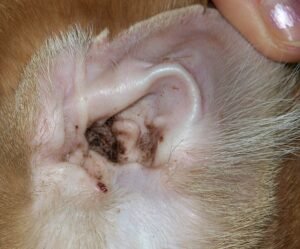Signs of Ear Infection? How to Prevent?
Cats can suffer from ear infections just like humans, leading to discomfort and various symptoms. Recognizing the signs early and knowing some safe home remedies can help manage the condition until professional veterinary care is sought. Stay with this CatsandWoofs article to get informed about cat ear infections and home remedies to help your cat have a pleasant experience.

Causes?
Ear infections are often caused by bacteria, “Malassezia” fungus, ear mites, or ticks.
Signs?
- Discharge and Ear Wax: Cats usually have a small amount of light brown ear wax. If you see a larger amount of ear wax, or dark brown, black, green, or white colored wax, this can be a sign of an ear infection.
- Redness: A normal cat ear should be light pink in color. If redness is noticed inside the ear or around the ear, it could be a sign of an ear infection.

- Odor: A strong, unpleasant odor coming from the ears can be a sign of infection.
- Scratching and Head Shaking: Cats with ear infections often scratch their ears frequently or paw at them. Repeated head shaking or tilting to one side can indicate discomfort or an attempt to alleviate irritation.
- Swollen Ears: Swollen ears are often caused by excessive head shaking and the rupture of a blood vessel in the ears. This condition is also known as “Aural Hematoma.” A swollen ear is a sign of ear infection.

Home Remedies
Warm Compress: Apply a warm, damp cloth to the affected ear to help reduce inflammation and discomfort.
- How to Use: Hold the warm compress against the ear for a few minutes, ensuring it’s not too hot to avoid burns.
Apple Cider Vinegar Solution: Dilute apple cider vinegar with equal parts water and use it as a natural antiseptic.
- How to Use: Soak a cotton ball in the solution and gently clean the outer part of the ear. Do not insert it into the ear canal.

Coconut Oil: Coconut oil has anti-fungal and anti-bacterial properties.
- How to Use: Warm the oil slightly and apply a few drops to the affected ear. Massage the base of the ear gently to ensure it spreads.
Olive Oil: Olive oil can help to soften wax and soothe irritated ears.
- How to Use: Warm the olive oil and apply a few drops into the ear. Massage the ear gently and wipe away any excess with a cotton ball.
Green Tea: Green tea has anti-inflammatory properties that can help reduce swelling.
- How to Use: Brew a cup of green tea, let it cool, and apply a few drops into the ear using a dropper.

Important Considerations
- Do Not Use Hydrogen Peroxide or Alcohol: These can irritate the ear canal and exacerbate the infection.
- Avoid Deep Cleaning: Never insert anything deep into the cat’s ear as it can cause injury or push the infection deeper.
- Monitor for Allergies: Watch for any adverse reactions to home remedies and discontinue use if any occur.
- Consult a Veterinarian: If the infection persists, worsens, or if you notice severe symptoms like balance issues or hearing loss, seek professional veterinary care immediately.

